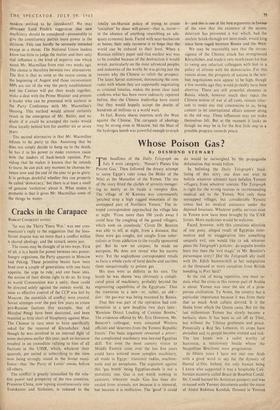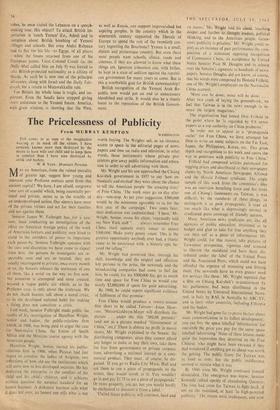Whose Poison Gas?
By DESMOND STEWART
rr HE headlines of the Daily Telegraph on I July 8 were categoric: 'Nasser's Planes Use Poison Gas.' Then followed the dreary attempt to name Egypt's ruler. (once the Hitler of the Nile) as the Mussolini of the Yemen. The site of the story fitted the cliches of atrocity-monger- ing as neatly as its locale a vampire film. The village of Al Kawma was conveniently `perched atop a high rugged mountain of the unmapped part. of Northern Yemen.' The in- trepid correspondent approached the village late at night. `From more than 100 yards away I could hear the coughing of the gassed villagers, which went on ceaselessly.' Clever Dr. Beeston was able to tell, at night, from a distance, that these were gas coughs, not coughs from tuber- culosis or from addiction to the royally sponsored qat. But he saw no corpses; he made no autopsies. He does not reveal who his escorts were. Yet the anglophone correspondent retails' as facts a whole cycle of lurid deaths and ascribes them unequivocally to poison gas.
His eyes were as definite as his ears. The bomb he was shown `was obviously a compli- cated piece of machinery, probably beyond the engineering capabilities of the Egyptians.' Thus the transition to a new—or, rather, an old— slur : the gas-war was being mounted by Russia.
That this was part of the operation had con- firmation in a new headline two days later: `Russians Direct Loading of Canister Bombs.' The evidences offered by Mr. Eric Downton, Mr. Beeston's colleague, were unnamed Western officials and 'deserters from the Yemeni Republic forces.' The basic argument remained a priori: the complicated machinery was beyond Egyptian skill. Yet even the most cursory visitor to Middle Eastern cities over the last five years could have noticed more complex machinery, all made in Egypt: transistor radios, machine- tools and jet aeroplanes. The argument against this 'gas bomb' being Egyptian-made is not a moralistic one. Gas is not worth stowing in canisters, wherever made. Gas has been dis-: carded from arsenals, not because it is immoral, but because it is ineffective. The `good' it could do would be outweighed by the propaganda defamation that would follow.
In belittling the Daily Telegraph's head- lining of this story one does not wish to belittle whatever ailments have befallen Yemeni villagers, from whatever sources. The Telegraph is right for the wrong reasons in recommending medical aid to the Yemen. Not only these unmapped villages, but considerable Yemeni towns had no medical assistance under the deposed Imamate. Whatever public services exist in Yemen now have been brought by the UAR forces. More medicines would be welcome.
Faced, however, with this conscious selection of one puny, alleged result of Egyptian inter- vention and its exaggeration into something uniquely evil, one would like .to ask whoever plans the Telegraph's policies: do napalm bombs burn less than the 'evil magic' in Mr. Beeston's picturesque story? Did the Telegraph ally itself with Dr. Edith Summerskill in her indignation at the thousand or more casualties from British bombing in Port Said?
At the risk of being repetitive, one must re- state what the crisis in this remote part of Arabia is about. Yemen was once the site of a pros- perous civilisation. To Arabs, the country has a particular importance because it was from there that so much Arab culture derived. It is the Sheba from which the Queen came. But for the last millennium Yemen has slowly become a barbaric slum. It has been as cut off as Tibet, but without the Tibetan gentleness and peace. Potentially a Red Sea Lebanon, its crops have dwindled and its people become stunted and sick. The late Imam was a sadist worthy of Suetonius, a reactionary beside whom the Neapolitan Bourbons:were progressives.
In fifteen years I have not met one Arab with a good word to say for the dynasty of Hamid al-Din. Indeed, the only human being I know who supported it was a hospitable Cali- fornian eccentric called Bruce de Bourbon Conde. Mr. Conde burned his American passport and was re-issued with Yemeni documents under the name of Abdul Rahman Kundah. Dressed in Yemeni robes, he once visited the Lebanon on a speech- making tour. His object? To attack British im- perialism in 'south Yemen' (i.e., Aden) and to :omplain about British bombing of Yemeni villages and schools. But even Abdul Rahman had to flee for his life—to Egypt, of all places —when the Imam returned from one of his European jaunts. Licut.-Colonel Conde (as the Daily Mail called him on July 9) was forced to iake British-protected nationality as a citizen of Sharja. As such he is now one of the principal idvocates, along with Israel. and the Daily Tele- graph, for a return to Mutawakkalite rule.
For Britain the whole issue is tragic, and im- portant. Even the Saudis have stopped giving overt assistance to the Yemeni Imam. America, with great wisdom, is showing that the West, as well as Russia, can support impoverished but aspiring peoples. Is the country which in the nineteenth century supported the liberals of Europe to spend the rest of the twentieth cen- tury regretting the Bourbons? Yemen is a small, distant and picturesque country. But even there most people want schools, clinics, roads and cinemas, if they are allowed to know what these things are. Ignorant tribesmen can, with bribes, be kept in a state of sedition against the republi- can government for many years to come. But is this a worthwhile goal for British statesmanship?
British recognition of the Yemeni Arab Re- public now would put an end to unnecessary bloodshed and strife. It would also be a timely boost to the reputation of the British Govern- ment.































 Previous page
Previous page